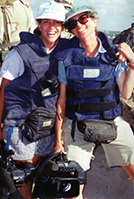No Ordinary life

| Original title: | No Ordinary life |
| Director: | Heather O'Neill |
| Release: | Cinema |
| Running time: | 77 minutes |
| Release date: | 31 december 2099 |
| Rating: |
Nicole's Review
With revealing access, the gripping documentary No Ordinary Life spotlights the esteemed careers of five courageous camera women who thrust themselves into dangerous circumstances—wars, calamities and uprisings—to bear witness and give a platform to the most vulnerable. Heather O’Neill’s thoughtful portrait of these five resilient women brings their sense of purpose—and the risks they took throughout their assignments—to the forefront.
From Emmy and Peabody Award winner Heather O’Neill, No Ordinary Life is a masterful directorial debut in the feature film documentary space. Drawing upon her personal experience as a journalist and her rich background in documentary projects, Heather crafted a fascinating ride along with the daring women who have captured some of recent history’s most iconic images. By virtue of the craft of photo journalism, we see the footage, not the people recording it; this documentary offers us a rare opportunity to know who was on the other side of the lens, capturing moments that are seared in our minds and have moved our hearts.
The documentary opens with a panoramic view of Cairo, befitting the subject matter not only of photography but also the faraway places journalists must travel. We then find Mary Rogers with her camera on the hillside. She says she was Inspired as a child by her parents’ National Geographic magazine and vowed her job would travel the world. We cut to footage from her perspective, amidst an ambush, desperately trying to get away, to safety.
We follow Mary back in time to a campfire she shared with fellow photojournalists, including Maria Fleet, Margaret Moth, Jane Evans and Cynde Strand. This is their story, told through a collection of interviews and rare footage of them in the field--both past and sometimes present. All began their careers as young women, inspired by the desire to tell stories, so that the rest of the world could see and understand. Jane Evans traces her inspiration back to 4th grade, when she received a camera as a gift, which she sees as a gift to the world. She feels with a camera, we’re empowered to capture moments that help us understand each other. This drive led them to become frontline combat camera women, very much at their own peril. Maria Fleet recounts how once she went on field assignment, she never wanted to be indoors again. Some people just aren’t cut out for an ordinary life.
We travel back in time to Croatia, 1992, footage and stills of the women in the field intercut with Maria Fleet’s interviews. A sisterhood. Then on to Ramallah, 2002. Margaret Moth says they were not there to take pictures--they were there to get the truth.
We find ourselves in the middle of an angry mob of Middle Eastern men, through Mary’s lens. She is the only woman present, in a land where she is not only a foreigner and Westerner but also a woman. There is a growing sense of danger. It’s the Arab Spring Uprising. Mary says she is lucky to have lived to tell the tale. We follow Mary through battlefields, with bullets whizzing by. Into Cairo and the Egyptian Revolution.
They speak about the challenges of being women in a predominantly male dominated field. Jane says they had to be twice as good to be seen as equals. In fact, Jane had been denied her first job interview because they said it’s not a job for a woman; she decided to prove them wrong, getting an assignment through a different company, and travelling to war-torn Lebanon. Amids shelling and shooting, we see footage of her courageously filming. It wasn’t until later she and the others became aware of the PTSD.
Maria says that people could see something different about their footage, as women; they noticed things the men didn’t. It made their images and footage special. They focused on the humans in telling the story.
Maria recounted how humbling it was that people allowed them to film during the most difficult time of their lives. She feels privileged to have told their stories. Jane spoke about how she helped garner aid for Somalia, when her footage capturing the famine reached the world.
This documentary offers the opportunity to live their lives vicariously, tagging along on exciting and dangerous journalistic assignments around the world--Mosul, Iraq 2007 with unbelievable destruction, Tiananmen Square and the students’ fight for freedoms, the African bushmen, the Kurdish Refugee crisis, Burma, Croatia, Sarajevo, the Genocide in Rawanda and the ensuing fate of the aggressors who fell ill to cholera. Throughout it all, they managed to never lose their empathy.
No ordinary life
Directed by Heather O’Neill
Produced by Heather O’Neill and Rich Brooks
Executive producer : Tom Johnson
Starring Maria Fleet, Jane Evans, Cynde Strand, Mary Rogers, Margaret Moth and Christine
Cinematography : Rich Brooks
Edited by Neal Broffman
Production companies :
Distributed by Array Films (United States)
Release date : June 16, 2021 (Tribeca)
Running time : 77 minutes
Seen June 17, 2021 (Press Access Tribeca Festival Online)
Nicole's Mark:

